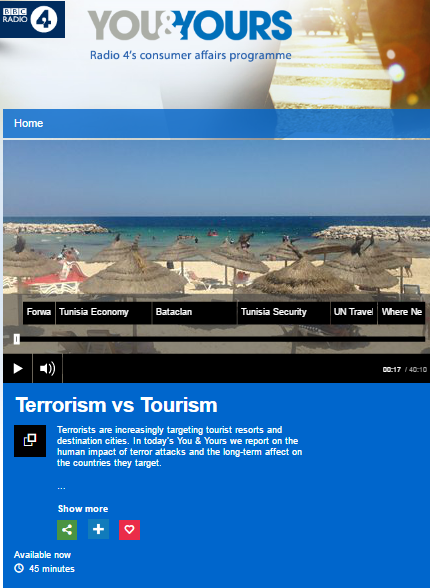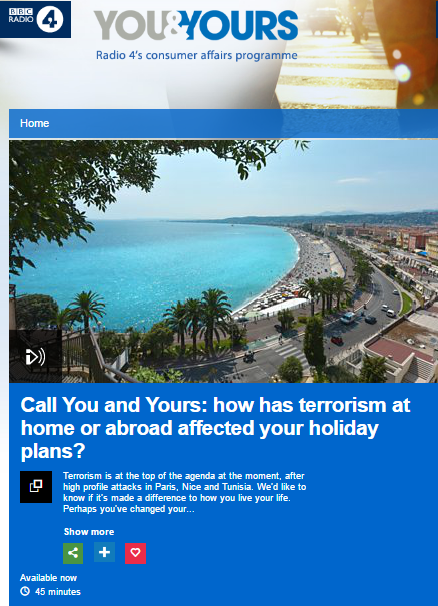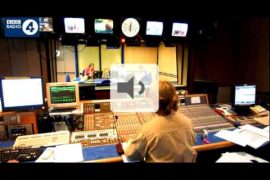Further examples of the double standard evident in the BBC’s use of the term terrorism were recently supplied by a series of programmes broadcast on BBC Radio 4.
On August 29th the station’s consumer affairs programme ‘You & Yours’ – presented by Winifred Robinson – broadcast an edition titled “Terrorism vs Tourism” which discussed the impact of terrorism “on people flying to Mediterranean resorts”.
“Terrorists are increasingly targeting tourist resorts and destination cities. In today’s You & Yours we report on the human impact of terror attacks and the long-term affect [sic] on the countries they target.
New research commissioned by You & Yours shows to what extent passenger numbers travelling to British holiday destinations, including France, Tunisia, Turkey, and Egypt have been affected by attacks over the last two years.”
Unsurprisingly, Israel – which has both past and recent experience of dealing with the effects of terrorism on its tourist industry – was not included among those “Mediterranean resorts”.
The following day – August 30th – another programme on the same topic was aired under the title “Call You and Yours: how has terrorism at home or abroad affected your holiday plans?“.
“Terrorism is at the top of the agenda at the moment, after high profile attacks in Paris, Nice and Tunisia. We’d like to know if it’s made a difference to how you live your life. Perhaps you’ve changed your destination – or had second thoughts about taking your family abroad.
We’d also like to hear from you if you work in the tourism industry, tell us how has terrorism affected business.”
The September 5th edition of ‘You & Yours’ included an item on “Egypt tourism“.
“Exclusive research commissioned by You and Yours shows how visitor numbers to Egypt are dropping since political unrest and terror attacks – we report on how the tourism industry is suffering and how the UK’s Foreign and Commonwealth Office travel advice is decided.”
Throughout all three of those programmes, the term terror was used frequently and appropriately. Obviously the programme makers did not feel uncomfortable making the kind of “value judgements” which the BBC editorial guidelines on language when reporting terrorism instruct them to avoid.
“Terrorism is a difficult and emotive subject with significant political overtones and care is required in the use of language that carries value judgements. We try to avoid the use of the term “terrorist” without attribution. When we do use the term we should strive to do so with consistency in the stories we report across all our services and in a way that does not undermine our reputation for objectivity and accuracy.” […]
“…we don’t change the word “terrorist” when quoting other people, but we try to avoid the word ourselves; not because we are morally neutral towards terrorism, nor because we have any sympathy for the perpetrators of the inhuman atrocities which all too often we have to report, but because terrorism is a difficult and emotive subject with significant political overtones.”
Last month we noted here that the BBC had found a ‘working definition’ of terrorism with which it is apparently comfortable – at least when reporting on incidents in Europe.
“Terrorist attacks are acts of violence by non-state actors to achieve a political, social, economic or religious goal through fear, coercion or intimidation.”
Once again this series of Radio 4 programmes demonstrates all too clearly that those editorial guidelines are not being applied in a uniform and consistent manner. When the BBC wants to use words such as ‘terror’, ‘terrorism’ or ‘terrorist’, it does. When it wants to make “value judgements”, it does and in fact what dictates the BBC’s choice of terminology is “a political position” of precisely the type it claims to try to avoid.
Absurdly, while evidence to the contrary accumulates, the corporation continues to claim that its coverage of terrorism is consistent, accurate and impartial.
Related Articles:
BBC Complaints: terror attacks in Jerusalem and Tunisia are “very different”
Radio 4 gives insight into BBC avoidance of the use of the term ‘terror’ in Israel




